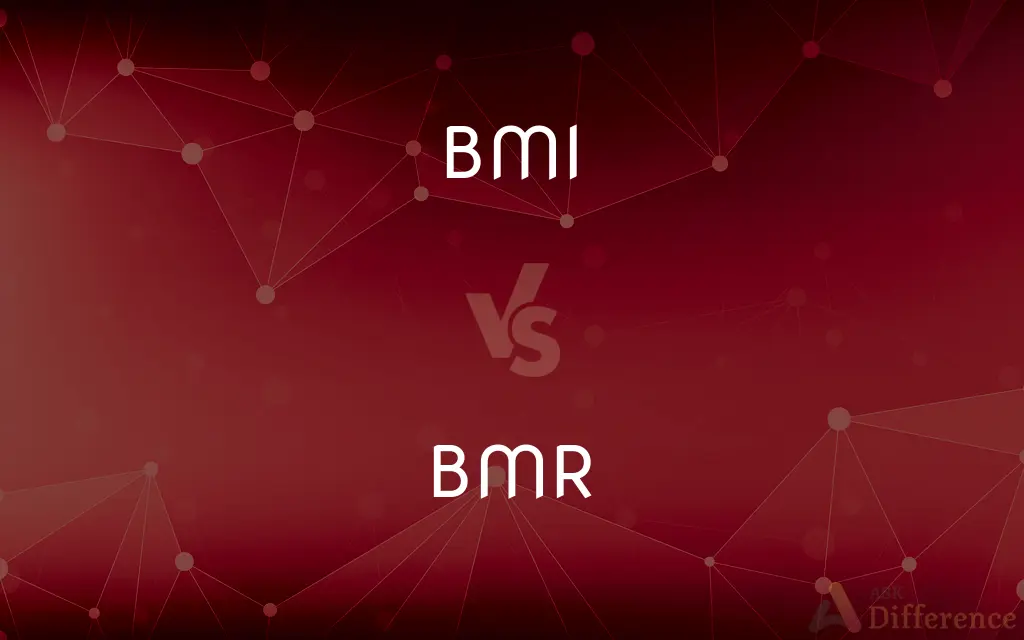BMI vs. BMR — What's the Difference?
By Tayyaba Rehman — Published on December 19, 2023
BMI (Body Mass Index) is a measure of body fat based on height and weight, whereas BMR (Basal Metabolic Rate) indicates the number of calories burned at rest.

Difference Between BMI and BMR
Table of Contents
ADVERTISEMENT
Key Differences
BMI, or Body Mass Index, and BMR, or Basal Metabolic Rate, are both crucial metrics in the health and fitness realm, but they serve different purposes. BMI is a simple calculation that divides an individual's weight by the square of their height. This ratio gives a numerical value that categorizes individuals into underweight, normal weight, overweight, or obese based on established ranges. BMR, on the contrary, calculates the number of calories one would burn if they remained at rest all day. It's the energy needed to maintain essential body functions like breathing and maintaining body temperature.
In the context of weight management, BMI serves as an initial screening tool. While it doesn't directly measure body fat, BMI gives a quick estimate of whether one's weight is appropriate for their height. On the other hand, BMR provides insights into an individual's metabolism. Knowing one's BMR can help in creating effective diet and exercise plans, ensuring that caloric intake aligns with the body's energy demands.
A point of contention regarding BMI is its oversimplification. Since it doesn't differentiate between muscle and fat, a very muscular person could be classified as overweight or obese based on their BMI. BMR, however, doesn't make such distinctions and remains focused on energy expenditure. It can be influenced by factors like age, gender, body composition, and overall health.
In general applications, BMI is often used in large-scale health studies to assess the overall health of populations. It's a straightforward, universally accepted measurement. BMR, conversely, finds its primary use in individualized fitness and nutrition planning. By understanding their BMR, individuals can make informed decisions about their daily caloric needs.
In sum, while both BMI and BMR offer valuable insights into health, they cater to different aspects. BMI evaluates the appropriateness of weight concerning height, while BMR sheds light on an individual's metabolic rate and energy requirements at rest.
ADVERTISEMENT
Comparison Chart
Definition
Ratio of weight to height squared.
Calories burned by the body at rest.
Purpose
Classifies individuals based on weight categories.
Indicates daily energy expenditure at rest.
Influencing Factors
Weight and height.
Age, gender, weight, height, body composition.
Shortcomings
Doesn't distinguish between muscle and fat.
Can vary based on factors like temperature and specific conditions.
Common Usage
Population health studies, initial health screenings.
Nutrition and fitness planning.
Compare with Definitions
BMI
Numerical value derived from weight and height.
A high BMI can indicate a higher percentage of body fat.
BMR
Influenced by age, gender, and body composition.
As people age, their BMR tends to decrease.
BMI
A screening tool for weight categorization.
His BMI placed him in the overweight category.
BMR
Represents the body's basic energy needs.
Even without moving, our bodies burn calories; that's our BMR.
BMI
Provides a quick snapshot of weight appropriateness.
A normal BMI range suggests your weight is in a healthy range for your height.
BMR
Essential for individualized nutrition planning.
To maintain weight, her daily caloric intake should match her BMR plus activity calories.
BMI
Used in epidemiological studies for health assessments.
Researchers found a rising average BMI in the studied population.
BMR
Indicates metabolism efficiency.
A higher BMR means the body naturally burns more calories at rest.
BMI
Does not directly measure body fat.
While her BMI is high, it's because of muscle, not fat.
BMR
Measures calorie expenditure at complete rest.
Understanding your BMR can help tailor your diet plan.
BMR
The rate at which heat is produced by an individual in a resting state
Common Curiosities
Why is BMR essential for diet plans?
Knowing BMR helps determine daily calorie needs based on activity levels.
What do BMI and BMR represent?
BMI indicates body fat based on height and weight, while BMR shows calorie burn at rest.
Is BMI a direct measure of health?
No, BMI is a screening tool and doesn't consider all health aspects.
Does exercise influence BMR?
Yes, building muscle can increase BMR since muscle requires more energy at rest.
Is a high BMI always bad?
Not necessarily. A high BMI can result from muscle mass, not just fat.
What factors affect BMR?
Age, gender, weight, height, and body composition influence BMR.
How often should I check my BMI and BMR?
As health and fitness goals evolve, checking periodically can be beneficial.
Can two people of the same weight have different BMIs?
Yes, if their heights are different, their BMIs can vary.
How can I increase my BMR?
Building muscle and staying active can boost BMR.
Can I use only BMI to design a fitness plan?
BMI alone isn't comprehensive. Consider other factors like body composition and fitness goals.
Does BMR decrease with age?
Yes, BMR typically decreases as one gets older.
Why do athletes sometimes have high BMIs?
Muscle mass can result in a high BMI, even if an athlete has low body fat.
Is it possible for someone to have a low BMI but high body fat?
Yes, individuals with low muscle mass might have a low BMI but higher body fat percentage.
Are there other measures better than BMI for health?
Some prefer body fat percentage or waist-to-hip ratio over BMI for a more accurate health assessment.
Can BMI and BMR be used together in health assessments?
Absolutely, combining both can provide a holistic view of one's health and metabolic efficiency.
Share Your Discovery

Previous Comparison
Steric Strain vs. Torsional Strain
Next Comparison
OMR vs. OCRAuthor Spotlight
Written by
Tayyaba RehmanTayyaba Rehman is a distinguished writer, currently serving as a primary contributor to askdifference.com. As a researcher in semantics and etymology, Tayyaba's passion for the complexity of languages and their distinctions has found a perfect home on the platform. Tayyaba delves into the intricacies of language, distinguishing between commonly confused words and phrases, thereby providing clarity for readers worldwide.
















































